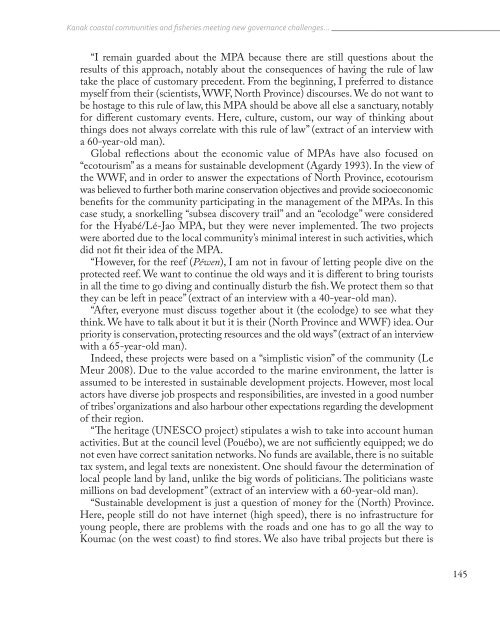Fisheries in the Pacific
Fisheries_in_the_Pacific
Fisheries_in_the_Pacific
You also want an ePaper? Increase the reach of your titles
YUMPU automatically turns print PDFs into web optimized ePapers that Google loves.
Kanak coastal communities and fisheries meet<strong>in</strong>g new governance challenges…<br />
“I rema<strong>in</strong> guarded about <strong>the</strong> MPA because <strong>the</strong>re are still questions about <strong>the</strong><br />
results of this approach, notably about <strong>the</strong> consequences of hav<strong>in</strong>g <strong>the</strong> rule of law<br />
take <strong>the</strong> place of customary precedent. From <strong>the</strong> beg<strong>in</strong>n<strong>in</strong>g, I preferred to distance<br />
myself from <strong>the</strong>ir (scientists, WWF, North Prov<strong>in</strong>ce) discourses. We do not want to<br />
be hostage to this rule of law, this MPA should be above all else a sanctuary, notably<br />
for different customary events. Here, culture, custom, our way of th<strong>in</strong>k<strong>in</strong>g about<br />
th<strong>in</strong>gs does not always correlate with this rule of law” (extract of an <strong>in</strong>terview with<br />
a 60-year-old man).<br />
Global reflections about <strong>the</strong> economic value of MPAs have also focused on<br />
“ecotourism” as a means for susta<strong>in</strong>able development (Agardy 1993). In <strong>the</strong> view of<br />
<strong>the</strong> WWF, and <strong>in</strong> order to answer <strong>the</strong> expectations of North Prov<strong>in</strong>ce, ecotourism<br />
was believed to fur<strong>the</strong>r both mar<strong>in</strong>e conservation objectives and provide socioeconomic<br />
benefits for <strong>the</strong> community participat<strong>in</strong>g <strong>in</strong> <strong>the</strong> management of <strong>the</strong> MPAs. In this<br />
case study, a snorkell<strong>in</strong>g “subsea discovery trail” and an “ecolodge” were considered<br />
for <strong>the</strong> Hyabé/Lé-Jao MPA, but <strong>the</strong>y were never implemented. The two projects<br />
were aborted due to <strong>the</strong> local community’s m<strong>in</strong>imal <strong>in</strong>terest <strong>in</strong> such activities, which<br />
did not fit <strong>the</strong>ir idea of <strong>the</strong> MPA.<br />
“However, for <strong>the</strong> reef (Péwen), I am not <strong>in</strong> favour of lett<strong>in</strong>g people dive on <strong>the</strong><br />
protected reef. We want to cont<strong>in</strong>ue <strong>the</strong> old ways and it is different to br<strong>in</strong>g tourists<br />
<strong>in</strong> all <strong>the</strong> time to go div<strong>in</strong>g and cont<strong>in</strong>ually disturb <strong>the</strong> fish. We protect <strong>the</strong>m so that<br />
<strong>the</strong>y can be left <strong>in</strong> peace” (extract of an <strong>in</strong>terview with a 40-year-old man).<br />
“After, everyone must discuss toge<strong>the</strong>r about it (<strong>the</strong> ecolodge) to see what <strong>the</strong>y<br />
th<strong>in</strong>k. We have to talk about it but it is <strong>the</strong>ir (North Prov<strong>in</strong>ce and WWF) idea. Our<br />
priority is conservation, protect<strong>in</strong>g resources and <strong>the</strong> old ways” (extract of an <strong>in</strong>terview<br />
with a 65-year-old man).<br />
Indeed, <strong>the</strong>se projects were based on a “simplistic vision” of <strong>the</strong> community (Le<br />
Meur 2008). Due to <strong>the</strong> value accorded to <strong>the</strong> mar<strong>in</strong>e environment, <strong>the</strong> latter is<br />
assumed to be <strong>in</strong>terested <strong>in</strong> susta<strong>in</strong>able development projects. However, most local<br />
actors have diverse job prospects and responsibilities, are <strong>in</strong>vested <strong>in</strong> a good number<br />
of tribes’ organizations and also harbour o<strong>the</strong>r expectations regard<strong>in</strong>g <strong>the</strong> development<br />
of <strong>the</strong>ir region.<br />
“The heritage (UNESCO project) stipulates a wish to take <strong>in</strong>to account human<br />
activities. But at <strong>the</strong> council level (Pouébo), we are not sufficiently equipped; we do<br />
not even have correct sanitation networks. No funds are available, <strong>the</strong>re is no suitable<br />
tax system, and legal texts are nonexistent. One should favour <strong>the</strong> determ<strong>in</strong>ation of<br />
local people land by land, unlike <strong>the</strong> big words of politicians. The politicians waste<br />
millions on bad development” (extract of an <strong>in</strong>terview with a 60-year-old man).<br />
“Susta<strong>in</strong>able development is just a question of money for <strong>the</strong> (North) Prov<strong>in</strong>ce.<br />
Here, people still do not have <strong>in</strong>ternet (high speed), <strong>the</strong>re is no <strong>in</strong>frastructure for<br />
young people, <strong>the</strong>re are problems with <strong>the</strong> roads and one has to go all <strong>the</strong> way to<br />
Koumac (on <strong>the</strong> west coast) to f<strong>in</strong>d stores. We also have tribal projects but <strong>the</strong>re is<br />
145


